Sharing is caring!
Wholesome and Delicious: Kale, Cauliflower, and Cabbage Recipe to Boost Your Health
Are you looking for a delicious and health-boosting recipe that incorporates this kale cauliflower cabbage recipe? Look no further! I will share a wholesome and tasty recipe that satisfies your taste buds and provides numerous health benefits. Cabbage was a vegetable I grew up on. My grammy used to boil it with salt, pepper, and butter.
Kale, cauliflower, and cabbage are nutrient powerhouses packed with vitamins, minerals, and antioxidants. They boost the immune system, support digestion, and promote overall well-being. Combining these three superfoods creates a dish that tastes amazing and is incredibly good for you.
Whether you’re a dedicated health enthusiast or want to explore new ways to include nutritious ingredients in your diet, this recipe is perfect. Its vibrant colors, delightful flavors, and impressive health benefits make it a win-win situation. Another dish I love is roasted cauliflower and kale salad.
So, treat yourself to a mouthwatering dish that will nourish your body and please your palate. Stay tuned for the step-by-step instructions for creating this wholesome and delicious kale, cauliflower, and cabbage recipe!
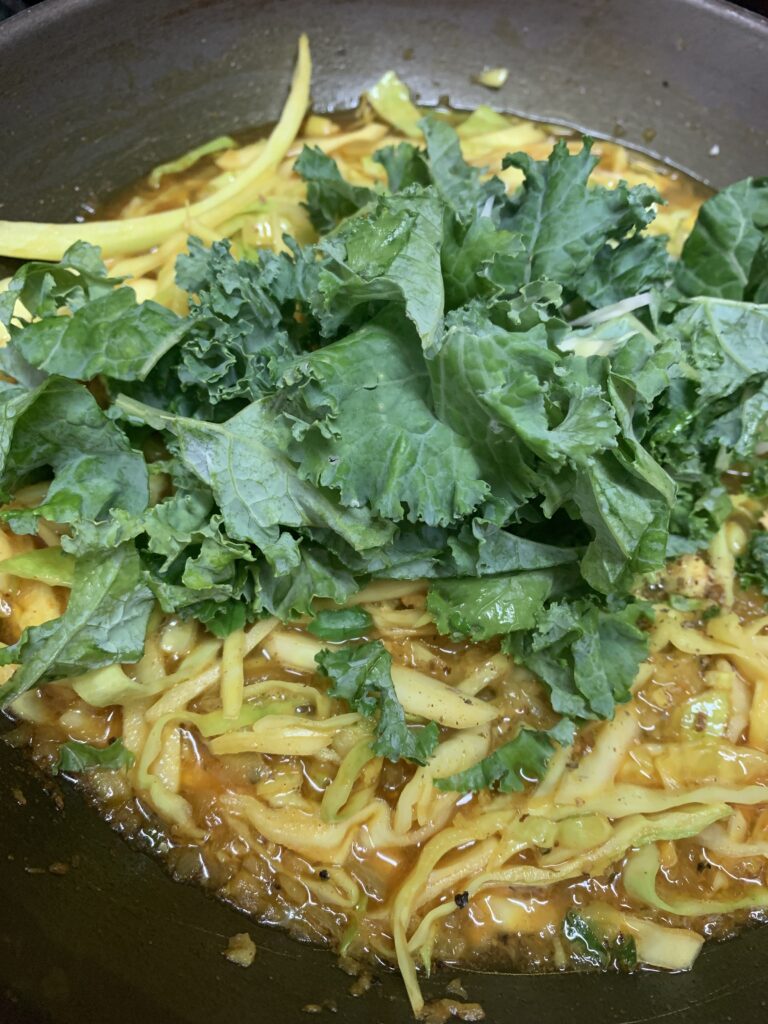
Health Benefits of Kale, Cauliflower, and Cabbage
Kale, cauliflower, and cabbage are delicious and offer many health benefits. Let’s look at what makes these superfoods so good for you.
### Kale
Kale is often called a nutritional powerhouse, and for good reason. It contains vitamins A, C, and K and minerals like calcium, potassium, and iron. These nutrients contribute to the following health benefits:
1. Boosts Immune System: Kale is rich in vitamin C, which can help enhance your immune system and protect against common illnesses.
2. Supports Bone Health: Kale’s high calcium content is essential for maintaining strong and healthy bones and reducing the risk of osteoporosis.
3. Promotes Eye Health: Kale’s high vitamin A levels can help improve vision and protect against age-related macular degeneration.
4. Aids Digestion: With its high fiber content, kale can support a healthy digestive system and prevent constipation.
### Cauliflower
Cauliflower is a versatile vegetable that is low in calories but high in nutrients. It is an excellent source of vitamin C, vitamin K, and folate, providing the following health benefits:
1. Supports Heart Health: Cauliflower contains compounds that can help reduce the risk of heart disease and lower cholesterol levels.
2. Boosts Brain Function: The choline in cauliflower is essential for brain development and supports cognitive function.
3. Anti-Inflammatory Properties: Cauliflower is rich in antioxidants that can help reduce inflammation and prevent chronic diseases.
4. Digestive Health: The high fiber content in cauliflower can promote a healthy digestive system and prevent digestive issues.
### Cabbage
Cabbage is a cruciferous vegetable that is low in calories but high in nutrients. It is an excellent source of vitamin C, vitamin K, and fiber, offering the following health benefits:
1. Cancer-Fighting Properties: Cabbage contains compounds that have been shown to reduce the risk of certain types of cancer, including colon and breast cancer.
2. Supports Heart Health: Cabbage’s fiber and potassium can help lower blood pressure and reduce the risk of heart disease.
3. Promotes Digestive Health: The high fiber content in cabbage can support a healthy digestive system and prevent constipation.
4. Boosts Immune System: Cabbage is packed with vitamin C, enhancing your immune system and protecting against common illnesses.
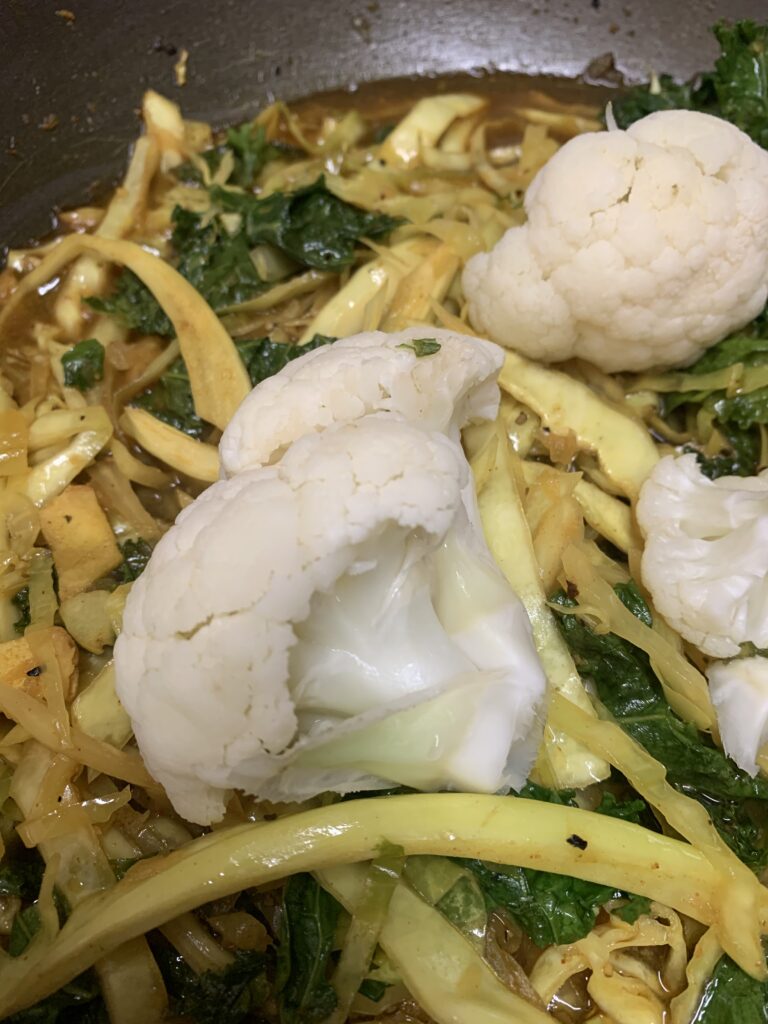
Nutritional Profile of Kale, Cauliflower, and Cabbage
Understanding the nutritional profile of kale, cauliflower, and cabbage can further highlight the health benefits of incorporating these superfoods into your diet.
### Kale Nutritional Profile
Kale is a nutrient-dense leafy green that offers an impressive array of vitamins, minerals, and antioxidants. Here is a breakdown of its nutritional composition per 100 grams:
– Calories: 49
– Carbohydrates: 9 grams
– Protein: 4 grams
– Fat: 0.9 grams
– Fiber: 2 grams
– Vitamin A: 206% of the daily recommended intake
– Vitamin C: 134% of the daily recommended intake
– Vitamin K: 684% of the daily recommended intake
– Calcium: 14% of the daily recommended intake
– Potassium: 9% of the daily recommended intake
### Cauliflower Nutritional Profile
Cauliflower is a cruciferous vegetable that is low in calories but rich in nutrients. Here is a breakdown of its nutritional composition per 100 grams:
– Calories: 25
– Carbohydrates: 5 grams
– Protein: 2 grams
– Fat: 0.3 grams
– Fiber: 2 grams
– Vitamin C: 77% of the daily recommended intake
– Vitamin K: 20% of the daily recommended intake
– Folate: 14% of the daily recommended intake
– Potassium: 9% of the daily recommended intake
### Cabbage Nutritional Profile
Cabbage is a low-calorie vegetable that offers a variety of vitamins, minerals, and antioxidants. Here is a breakdown of its nutritional composition per 100 grams:
– Calories: 25
– Carbohydrates: 6 grams
– Protein: 1 gram
– Fat: 0.1 grams
– Fiber: 2 grams
– Vitamin C: 36% of the daily recommended intake
– Vitamin K: 72% of the daily recommended intake
– Folate: 10% of the daily recommended intake
– Potassium: 4% of the daily recommended intake
Now that you know the incredible health benefits of kale, cauliflower, and cabbage, it’s time to dive into the recipe that combines these superfoods into a delicious and nutritious dish. Here’s a step-by-step guide to creating this wholesome recipe:
### Ingredients:
– 2 cups kale, chopped
– 2 cups cauliflower, cut into florets
– 2 cups cabbage, shredded
– 1 tablespoon olive oil
– 2 cloves garlic, minced
– 1 teaspoon turmeric
– 1/2 teaspoon allspice
– Salt and pepper to taste
### Instructions:
1. Heat the olive oil in a large skillet over medium heat. Add the minced garlic and sauté for 1-2 minutes until fragrant.
2. Add the cauliflower florets to the skillet and cook for 5-6 minutes until they soften.
3. Add the shredded cabbage and chopped kale to the skillet. Cook for 5 minutes until the vegetables are tender but still vibrant in color.
4. Sprinkle the turmeric and allspice over the vegetables and season with salt and pepper to taste. Stir well to coat the vegetables evenly with the spices.
5. Reduce the heat to low and cover the skillet. Allow the flavors to meld together for 2-3 minutes.
6. Remove heat and transfer the cooked vegetables to a serving dish. Serve hot and enjoy!
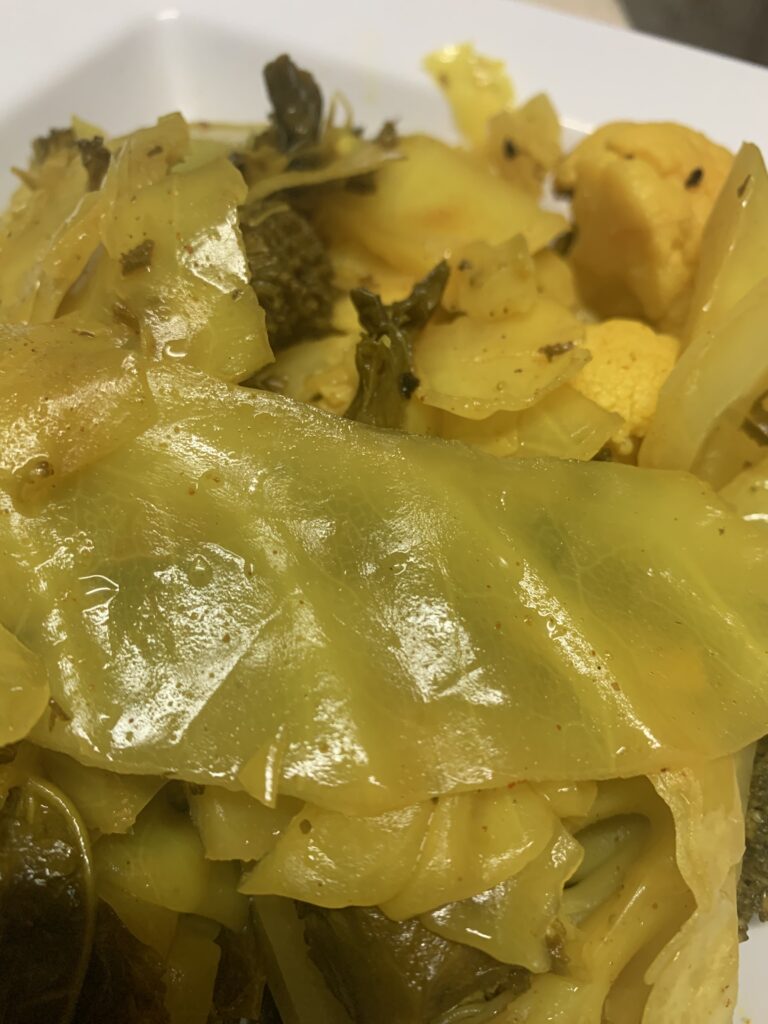
Tips for Cooking with Kale, Cauliflower, and Cabbage
Cooking with kale, cauliflower, and cabbage can be a breeze with these helpful tips:
1. Massage Kale: To tenderize the kale leaves, massage them with olive oil and a pinch of salt before adding them to your recipes. This helps to break down the tough fibers and enhance the flavor.
2. Roast Cauliflower: Try roasting cauliflower in the oven for a crispy and flavorful twist. Toss the florets with olive oil, salt, and pepper, and bake at 425°F (220°C) for 20-25 minutes until golden brown.
3. Stir-fry Cabbage: Cabbage is perfect for stir-frying. Heat a wok or skillet, add a splash of oil, and stir-fry the cabbage over high heat for a few minutes until it’s just wilted but still crunchy.
4. Experiment with Seasonings: Don’t be afraid to experiment with different seasonings and spices to enhance the flavor of your kale, cauliflower, and cabbage dishes. Try adding a squeeze of lemon juice, a sprinkle of chili flakes, or a dash of soy sauce for a unique twist.
Variations of the Kale Cauliflower Cabbage Recipe
While the basic recipe is delicious, you can get creative and add other ingredients to customize the dish. Here are a few variations to consider:
1. Protein Boost: To make the dish more filling and nutritious, add your favorite protein, such as grilled chicken, tofu, or chickpeas.
2. Cheesy Delight: Sprinkle grated cheese, such as Parmesan or cheddar, over the cooked vegetables for a creamy, cheesy twist.
3. Nutty Crunch: Add a handful of toasted nuts, such as almonds or walnuts, for an extra crunch and a boost of healthy fats.
4. Herb Infusion: To add freshness to the dish, experiment with different herbs, such as fresh basil, cilantro, or parsley.
Incorporating Kale, Cauliflower, and Cabbage into Your Daily Diet
To reap the maximum benefits of kale, cauliflower, and cabbage. Here are a few simple ways to do just that:
1. Salads: For added texture and nutrition, add chopped kale, cauliflower florets, and shredded cabbage to your favorite salads. You can also make a simple kale and roasted cauliflower salad drizzled with lime juice and coconut oil
2. Smoothies: Blend kale leaves, cauliflower florets, and cabbage with your choice of fruits and liquids for a nutritious and refreshing smoothie.
3. Stir-fries: Stir-fry kale, cauliflower, and cabbage with other vegetables and proteins for a quick and healthy meal. Try my delicious raw cauliflower couscous with kale.
4. Soups: Add kale, cauliflower, and cabbage to your favorite soups for extra vitamins and minerals.
While kale, cauliflower, and cabbage are incredibly nutritious, it’s essential to be aware of potential side effects and take necessary precautions:
1. Thyroid Function: Kale is a cruciferous vegetable containing goitrogens that can interfere with thyroid function. If you have an underactive thyroid or are on thyroid medication, it’s best to moderate your kale intake.
2. Digestive Issues: Some individuals may experience gas, bloating, or digestive discomfort when consuming cruciferous vegetables like cauliflower and cabbage. If you have a sensitive stomach, start with smaller portions and gradually increase your intake.
3. Blood Thinning Medication: Kale contains high levels of vitamin K, which can interfere with blood-thinning medications. If you’re taking such medicines, consult your healthcare provider before significantly increasing your kale consumption.

1. Can I use frozen kale, cauliflower, and cabbage for the recipe?
Yes, frozen vegetables can be used as a convenient alternative. Just make sure to thaw them before cooking and adjust the cooking time accordingly.
2. Can I substitute kale, cauliflower, or cabbage with other vegetables?
Absolutely! Feel free to experiment with other leafy greens, cruciferous vegetables, or root vegetables to create your unique recipe.
3. Can I make the dish ahead of time and reheat it?
Yes, you can make the dish ahead of time and reheat it. However, the vegetables may become softer upon reheating.
4. Can I freeze the cooked kale, cauliflower, and cabbage dish?
While it’s possible to freeze the dish, the texture of the vegetables may change upon thawing and reheating. For optimal taste and texture, consuming the dish fresh is best.
Conclusion: Making Kale, Cauliflower, and Cabbage a Staple in Your Healthy Eating Journey
Incorporating kale, cauliflower, and cabbage into your diet is a great way to boost your health and enjoy delicious meals at the same time. These superfoods offer many vitamins, minerals, and antioxidants that support your immune system, promote digestion, and contribute to overall well-being.
With the easy and delicious kale cauliflower cabbage recipe provided, you can explore the versatile ways of cooking with these nutrient powerhouses. The possibilities are endless, whether you enjoy them in salads, stir-fries, or soups.
Remember to embrace variations and experiment with seasonings to create dishes that suit your taste buds. By making kale, cauliflower, and cabbage a staple in your healthy eating journey, you’re nourishing your body with wholesome ingredients that will keep you feeling vibrant and energized. So, go ahead and start incorporating these mighty superfoods into your daily meals – your body will thank you!
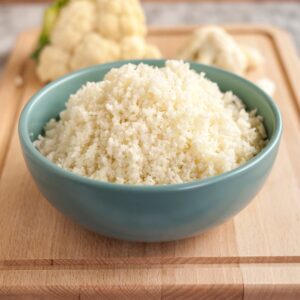
Raw Cauliflower Couscous with Kale and Bahamian Flavors
Ingredients
For the cauliflower couscous:
- 1 medium head of cauliflower cut into florets
- 1/4 cup diced red bell pepper
- 1/4 cup diced yellow bell pepper
- 1/4 cup diced orange bell pepper
- 1/4 cup diced red onion
- 2 tablespoons chopped fresh parsley
- Juice of 1 lemon
- 2 tablespoons coconut oil
- Salt and pepper to taste
For the Bahamian flavoring:
- 1/4 cup diced pineapple
- 1/4 cup diced mango
- 1/4 cup chopped fresh parsley
- 1 scotch bonnet pepper seeded and finely chopped
- Juice of 1 lime
- 1 tablespoon honey
- Salt to taste
For the kale:
- 4 cups kale leaves stems removed and chopped
- 1 tablespoon olive oil
- 2 cloves garlic minced
- Salt and pepper to taste
Instructions
Prepare the cauliflower couscous: In a food processor, pulse the cauliflower florets until they resemble couscous. Transfer to a large mixing bowl.
- Add the diced bell peppers, red onion, and chopped parsley to the cauliflower couscous.
- Whisk together the lemon juice, coconut oil, salt, and pepper in a small bowl. Pour the dressing over the cauliflower mixture and toss until well combined. Set aside.
Prepare the Bahamian flavoring: In another bowl, combine the diced pineapple, mango, chopped parsley, scotch bonnet pepper, lime juice, honey, and a pinch of salt. Stir well to combine and set aside. (Note: If you don’t have a scotch bonnet, use jalapenos.)
Prepare the kale: Heat olive oil in a large skillet over medium heat. Add minced garlic and cook for about 1 minute until fragrant. Add chopped kale leaves and sauté for 3-4 minutes until wilted. Season with salt and pepper to taste.
Assemble the dish: Divide the raw cauliflower couscous among serving plates. Top each portion with a generous spoonful of the Bahamian flavoring mixture. Serve with sautéed kale on the side.
Blog Post Recommendations


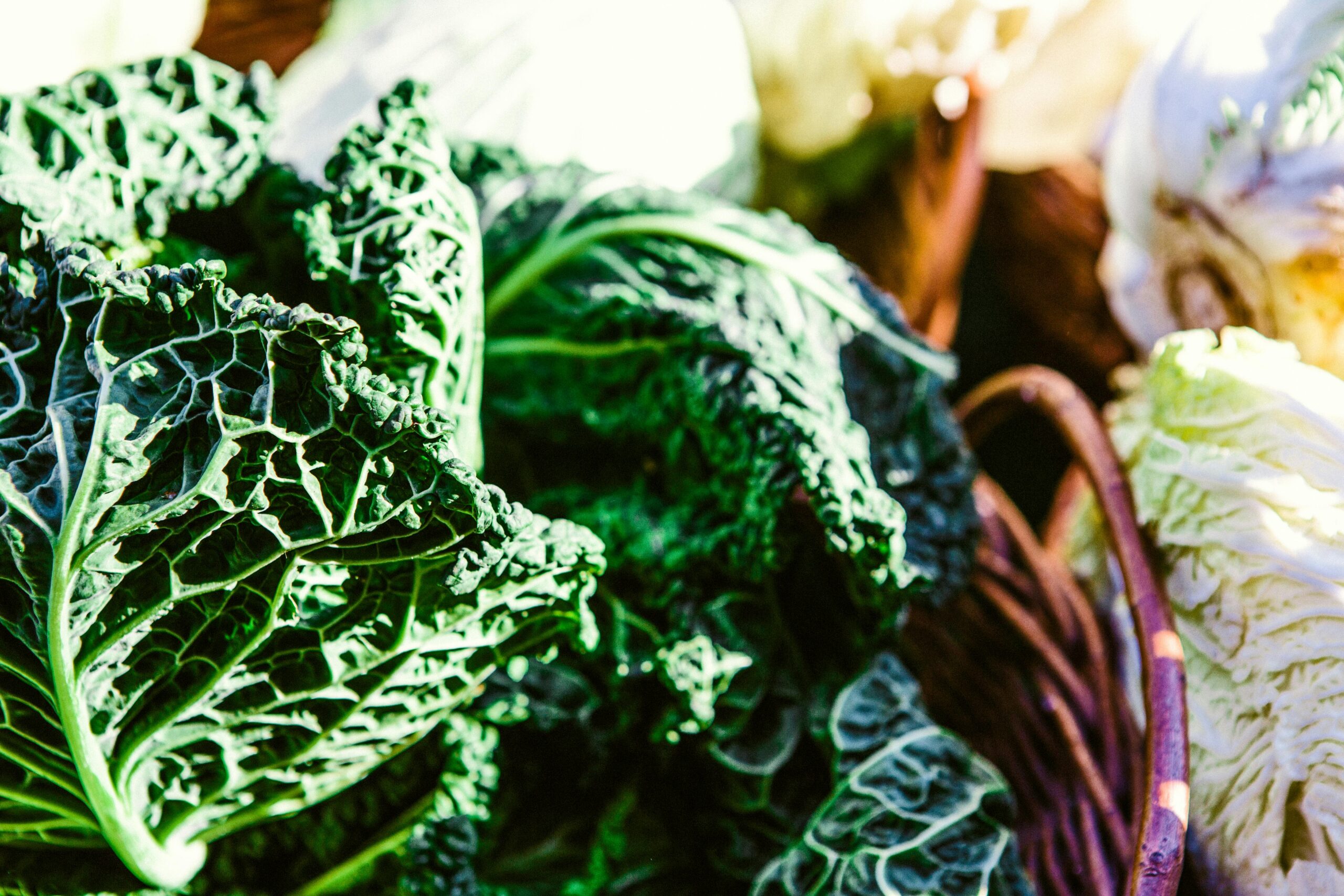
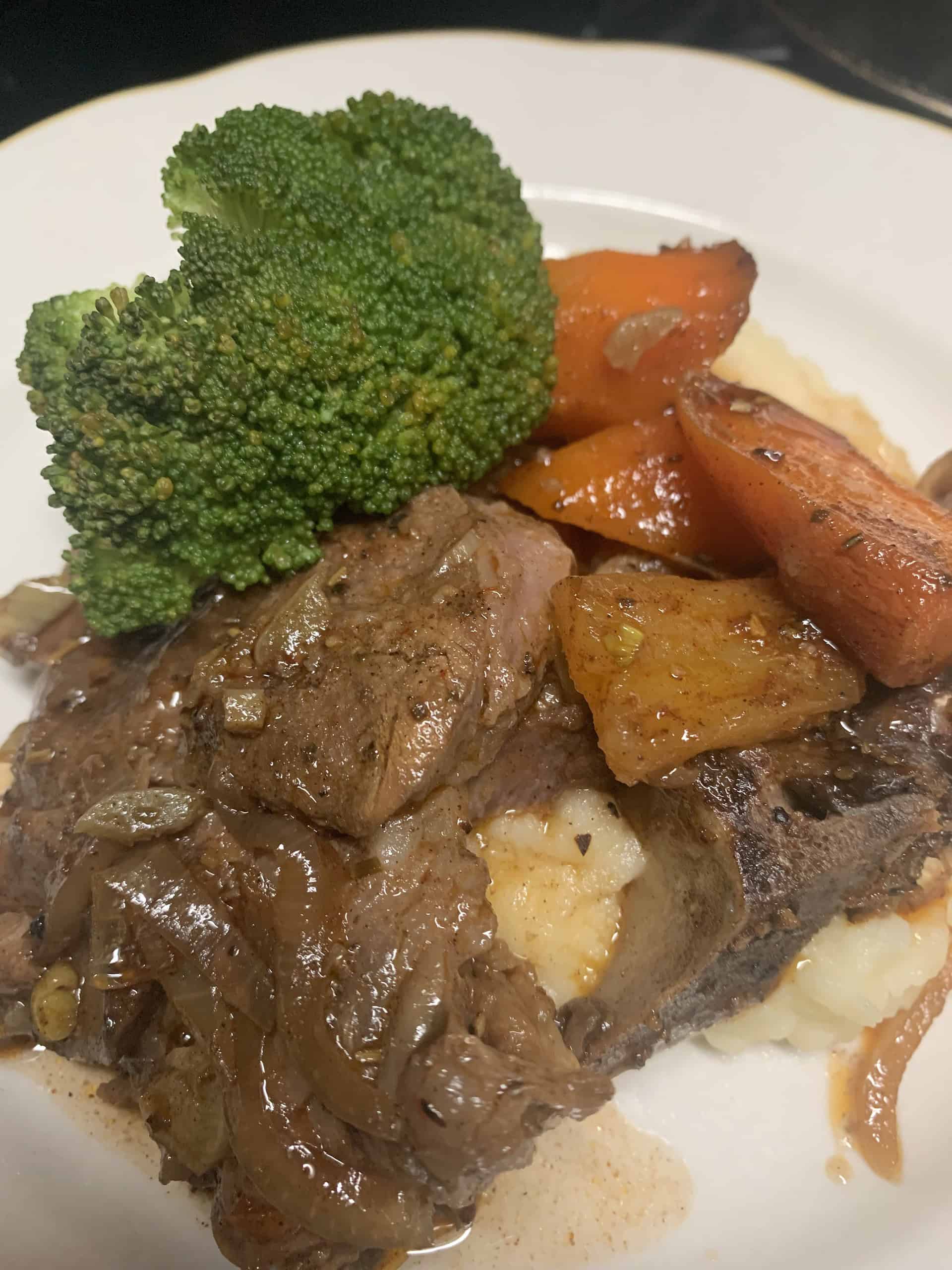
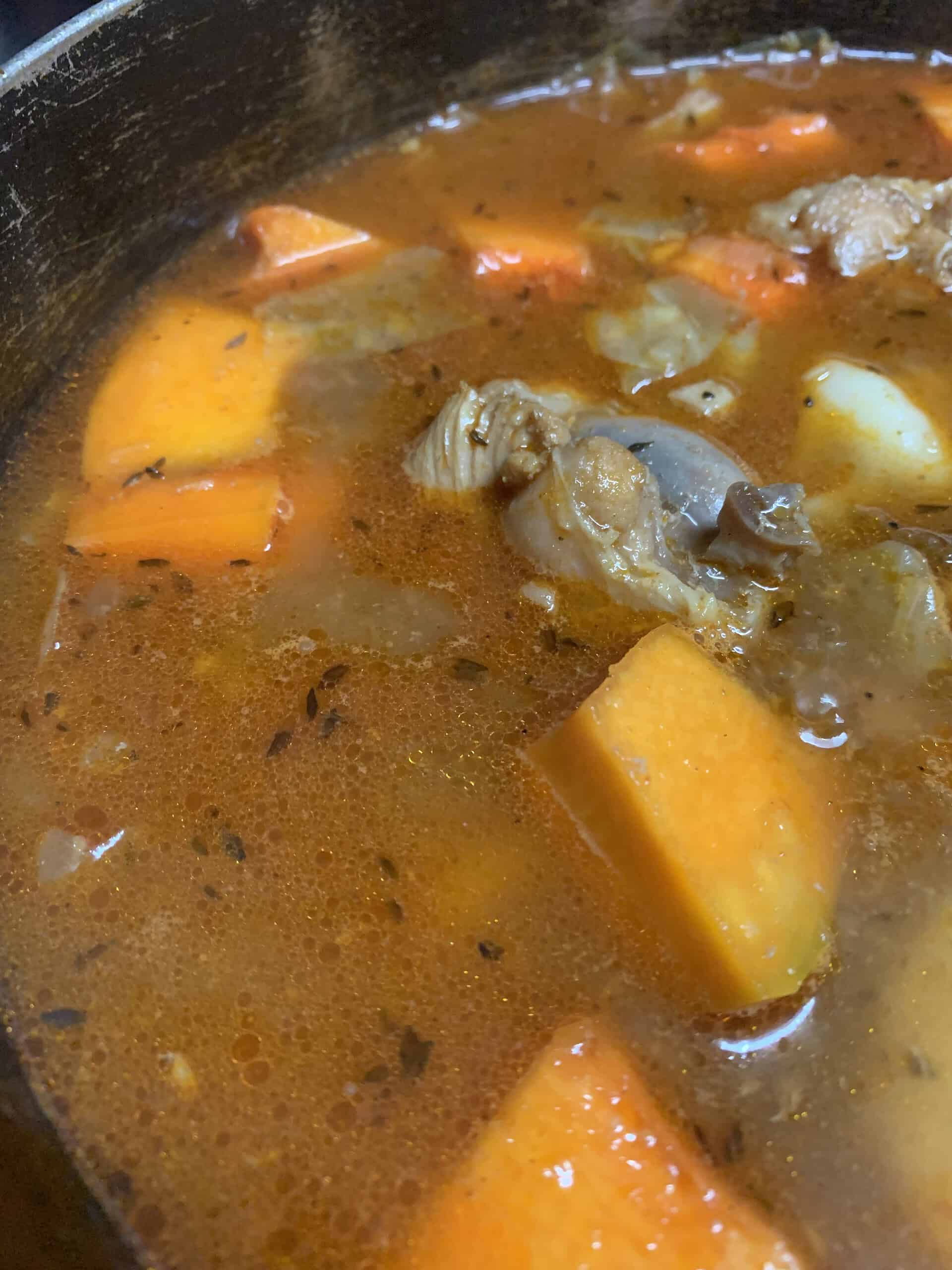




2 comments
Wonderful web site Lots of useful info here Im sending it to a few friends ans additionally sharing in delicious And obviously thanks to your effort
thank you for your feedback